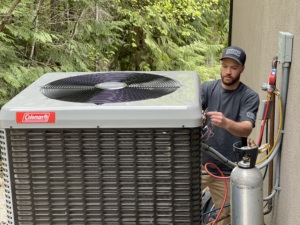
Lydia Churchill
Former Clean Energy Associate, Environment Massachusetts
This week’s White House climate report details the harsh and unprecedented impacts the country is already facing as a result of climate change. Massachusetts should take these four steps to ensure healthier communities and a livable climate for the Bay State.
Former Clean Energy Associate, Environment Massachusetts
Among the findings of this week’s major White House report on climate change was that “many of the climate conditions and impacts people are experiencing today are unprecedented for thousands of years.” Across the country, the report finds our climate is warming at an unparalleled pace, with higher frequency and intensity of extreme weather, such as hurricanes, heat-waves, flooding, heavy precipitation, and wildfires– and the risks are ever-increasing.
The White House report’s findings– though frightening– come as no surprise. This summer, we saw impacts of climate change play out here across the Bay State: due to flooding, farmers in Western Mass. suffered a loss of $15 million worth of crops and 200 homes were damaged in North Attleboro. Schools closed in Worcester, Lowell, and Framingham in early September as a result of heat waves. We know continued dependence on burning fossil fuels for energy is a leading cause of the climate crisis of which we are undoubtedly feeling the early impacts.
The report also declares “future climate impacts depend on choices made today.” Building on progress Massachusetts has made thus far, we have to seize opportunities to take steps right now toward a greener, healthier world, one in which we reduce our energy consumption, conserve our ecosystems, and rely only on pollution-free sources of energy.
Here are four steps Massachusetts can take to reduce global warming pollution, switch to clean energy and stake out a leading role in the effort to avert the worst impacts of climate change.
Massachusetts should set its sights on 100 percent renewable energy for electricity, heating, and transportation — the three sectors that are responsible for the vast majority of fossil fuel use in our state. The 100% Clean Act, filed by Rep. Decker and Rep. Garballey, would transition the Bay State to 100% clean electricity by 2035, and 100% clean heating and transportation by 2045. Eleven other states, including Maine and Rhode Island, have made commitments to 100% clean energy– Massachusetts should be next.

Photo by Tim O’Connor | Used by permission
Renewables are on the rise in Massachusetts, and to achieve 100% clean energy, we need to continue to incentivize their development and adoption. State lawmakers should provide incentives to put solar panels on built and disturbed land such as parking lots. They should also pass the Solar Neighborhoods Act, which would require solar panels to be installed on the roofs of new homes, apartments, and commercial buildings wherever it is feasible to do so.
Energy efficiency is a key tactic to reducing emissions: the cleanest energy is the energy we never use in the first place. Too many buildings across the Commonwealth are riddled with air leaks and inadequate insulation, wasting energy. Even more buildings are heated with outdated and inefficient heating systems. The Better Buildings Act and GREEN Act would retrofit homes, apartments, and larger office buildings, to make them more energy-efficient and reduce energy waste. We can also establish cleaner lighting by phasing out the sale of inefficient fluorescent bulbs in favor of LEDs.
From cars to gas-powered lawn equipment like polluting leaf-blowers to the water-heaters in our basements, we should encourage the switch to more efficient electric counterparts, which can also be powered by renewable energy, whenever possible. An Environment-Massachusetts backed provision to phase out the sale of gas-powered vehicles by 2035 passed last legislative session– and now we’re working to electrify our public transit, including regional transit authorities and school buses and public bus fleets. We are also educating the public about opportunities to use tax credits and rebates created by the Inflation Reduction Act to make their home a clean energy home.

Heat Pump Installation Sicamous BCPhoto by Phyxter.ai | CC-BY-4.0
Plastic is produced from fossil fuels– and manufacturing plastic is one of the most emissions-intensive industries. Curbing our consumption of single-use plastics is a great place to start, which is why we are supporting bills to phase out plastic bags and reduce styrofoam takeout containers across the state.
Our recycling programs in Massachusetts are also due for an update. A study finds that, nationally, we are only recycling about 5% of plastic we produce. We should update our state’s Bottle Bill because deposits are the single most successful tactic to promote the recycling of beverage containers. An updated bottle bill would expand the state’s deposit law to cover water bottles, “nips,” vitamin drinks and other containers, and raise the deposit from 5 to 10 cents. Nothing we use for a few minutes should litter our communities, sit in landfills, or pollute our oceans for hundreds of years.
Massachusetts has the opportunity to be a leader in the effort to curb the worst impacts of climate change. Let’s take these four steps to ensure healthier communities and a livable climate for the Bay State.
Take a look at Environment Massachusetts’ 2023-2024 legislative agenda for more.
Former Clean Energy Associate, Environment Massachusetts
